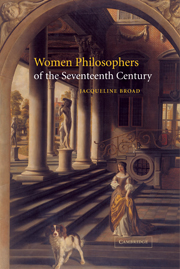2 - Margaret Cavendish
Published online by Cambridge University Press: 22 September 2009
Summary
Margaret Cavendish, the Duchess of Newcastle, was one of the most prolific and outspoken female philosophers of the early modern period. While Elisabeth's philosophy is confined to her correspondence, Cavendish published no less than six philosophical treatises in defence of her own distinctive form of monistic materialism. In these lengthy works, Cavendish deliberately and self-consciously defines her position alongside those of the leading philosophers of her day. Like Elisabeth, Cavendish is inspired by the rise of the new ‘egalitarian’ style of philosophy in seventeenth-century Europe; she is a champion of reason above the senses in natural philosophy; and she too addresses the problem of how two entirely distinct substances, the soul and the body, can causally interact. But unlike Elisabeth, Cavendish's mature philosophy was conceived in England in the 1660s, a period of growing mistrust and opposition to Cartesianism – particularly from the Cambridge Platonists, who, after an initial period of acceptance, were rather dissatisfied with the ‘atheistic’ overtones of Cartesian mechanism.
In this chapter, I examine Cavendish's responses to three key philosophical figures of her time: Descartes, Thomas Hobbes, and Henry More. Recent scholars emphasise that Cavendish has many views in common with Hobbes. Like the materialist philosopher, Cavendish believes that the only substance in the created world is matter; she rejects Cartesian dualism on the grounds that the idea of immaterial substance is inconceivable; and she supports Hobbes's separation of theology and philosophy.
- Type
- Chapter
- Information
- Women Philosophers of the Seventeenth Century , pp. 35 - 64Publisher: Cambridge University PressPrint publication year: 2003



